Stagnating house sales in Turkey prompt slowdown in construction
Mustafa Sönmez - mustafasnmz@hotmail.com
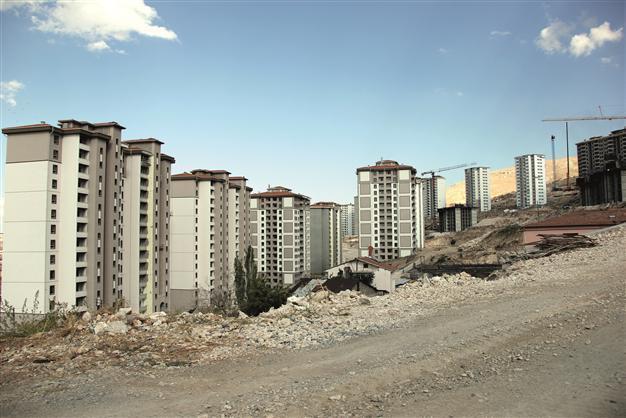
According to the latest data, there was a 20 percent decrease in housing sales in July 2014 when compared to the same month one year before. AA photo
The slowing of the tempo in housing, the locomotive sector of the ruling Justice and Development Party (AKP) era, and generally in construction investments has become quite apparent. In the construction investments, with predominantly residential constructions, 35 percent of which are done by the government (central government and municipalities), two thirds of which was done by the private sector, the growth in the first half of 2014 remained behind the prior four quarters and fell to 3 percent.In 2012, the annual growth stayed at 2.1 percent and the increase in construction investments remained below 1 percent; they speeded up in 2013 and investments increased nearly 9 percent. In all the four quarters of 2013 the tempo kept at a high level and the average investment increase reached 9 percent.
In 2014 though, this pace could not be maintained and the growth, which was nearly 6 percent in construction investments in the first quarter of the year, has gone down to 3.1 percent in the second quarter.
While the annual growth was 5 percent as an arithmetic average in the period between 2003 and 2013, the growth in construction reached an average of an annual 6.5 percent. Despite their share in total national income becoming 7 percent, construction investments have also directed the route of industry. Construction, which has activated several sub-branches of the manufacturing industry, from cement, to iron, to glass, ceramics, bricks and wood, has also changed this industry as to address the domestic market.
In these years, construction was also effective in also determining the course of finance. External bank loans were especially positioned as domestic consumer loans, with a share of nearly 25-30 percent. Mortgages hold the most important place among consumer loans. As of the end of September 2014, among the consumer loans stock, which had reached 270 billion Turkish Liras, loans for housing constitute 44 percent of it.
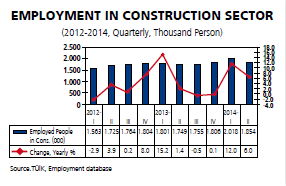 Also in employment…
Also in employment… The bottleneck in housing, and following it, the slowing down observed in the construction sector have also caused a decline in the number of people the sector employs. According to the data of the Turkish Statistical Institute (TÜİK) Household Work Force Survey, seasonally adjusted construction employment could not maintain its level of 2,018,000 people, reached the first quarter of the year, and dropped to 1,854,000 people, with a decrease of 164,000 in the second quarter.
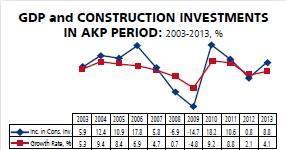
Why has it slowed down?
The slowdown in the pace in construction investments, which have become quite clear, is observed to come from predominantly housing investments, from the slowdown of the sale of housing units produced.
In mid-2013, the change in the global monetary climate that
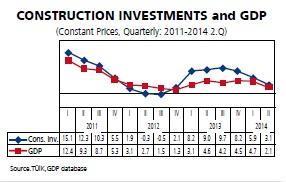 stemmed from the signals of the FED about its amendment of monetary policies diverted foreign investors to U.S. bonds. The exit of foreign capital from countries like Turkey increased and appetite for re-entries fell. When the political risk in Turkey was added to this, the exit of foreigners increased and the foreign exchange rate hiked in value by around 22 percent. This has caused an increase in costs in housing, as it did in all kinds of goods.
stemmed from the signals of the FED about its amendment of monetary policies diverted foreign investors to U.S. bonds. The exit of foreign capital from countries like Turkey increased and appetite for re-entries fell. When the political risk in Turkey was added to this, the exit of foreigners increased and the foreign exchange rate hiked in value by around 22 percent. This has caused an increase in costs in housing, as it did in all kinds of goods. More importantly, an increase in interest rates was experienced. In order to curb the increasing foreign exchange rate, in January 2014, interest rates were raised radically by 5.5 points to 10.5 percent, causing a chilling effect on the economy. The interest rates of mortgages, which constitute almost half of consumer loans, were also affected by the new climate causing a deep effect in the housing sector. The demand for mortgages went down considerably; a sharp fall was experienced in mortgaged home sales. TÜİK’s housing sales statistics show that mortgaged home sales, in other words, sales of housing units bought with bank loans have fallen sharply. As a result of this, housing stocks have increased; thus followed by a decrease in housing investments.
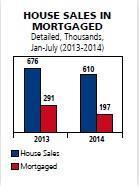 According to the latest data, there was a 20 percent decrease in housing sales in July 2014, when compared to the same month one year before. In July, only 85,000 units were sold. The sale of mortgaged houses went back 33 percent, when compared to the same moth of the previous year.
According to the latest data, there was a 20 percent decrease in housing sales in July 2014, when compared to the same month one year before. In July, only 85,000 units were sold. The sale of mortgaged houses went back 33 percent, when compared to the same moth of the previous year. The period between January 2014 and July 2014, in other words, the first seven-month period, gives a clearer picture. In this period, housing sales decreased 66,000 to drop to nearly 610,000 compared to the total of seven months from the same period the previous year. This corresponds to a decrease of 10 percent. But the real drop was experienced in the sales of mortgaged houses. In the first seven months of 2013, mortgaged houses, the ones bought with bank loans, were 291,000, whereas this figure fell to 197,000 in the first seven months of 2014. This means a decline of more than 32 percent and constitutes the main reason why construction investments have slowed.
The most important reason the sales of mortgaged homes declined is the increasing interest rates, as well as the increasing foreign exchange rates, which both negatively affect the costs of houses, causing the low course in the demand.
Because of the high inflation rate, interest rates will not decrease in the coming months, thus the demand for housing loans will not pick up, and it looks probable that the slowdown in the sector will also continue in the coming quarters.
















